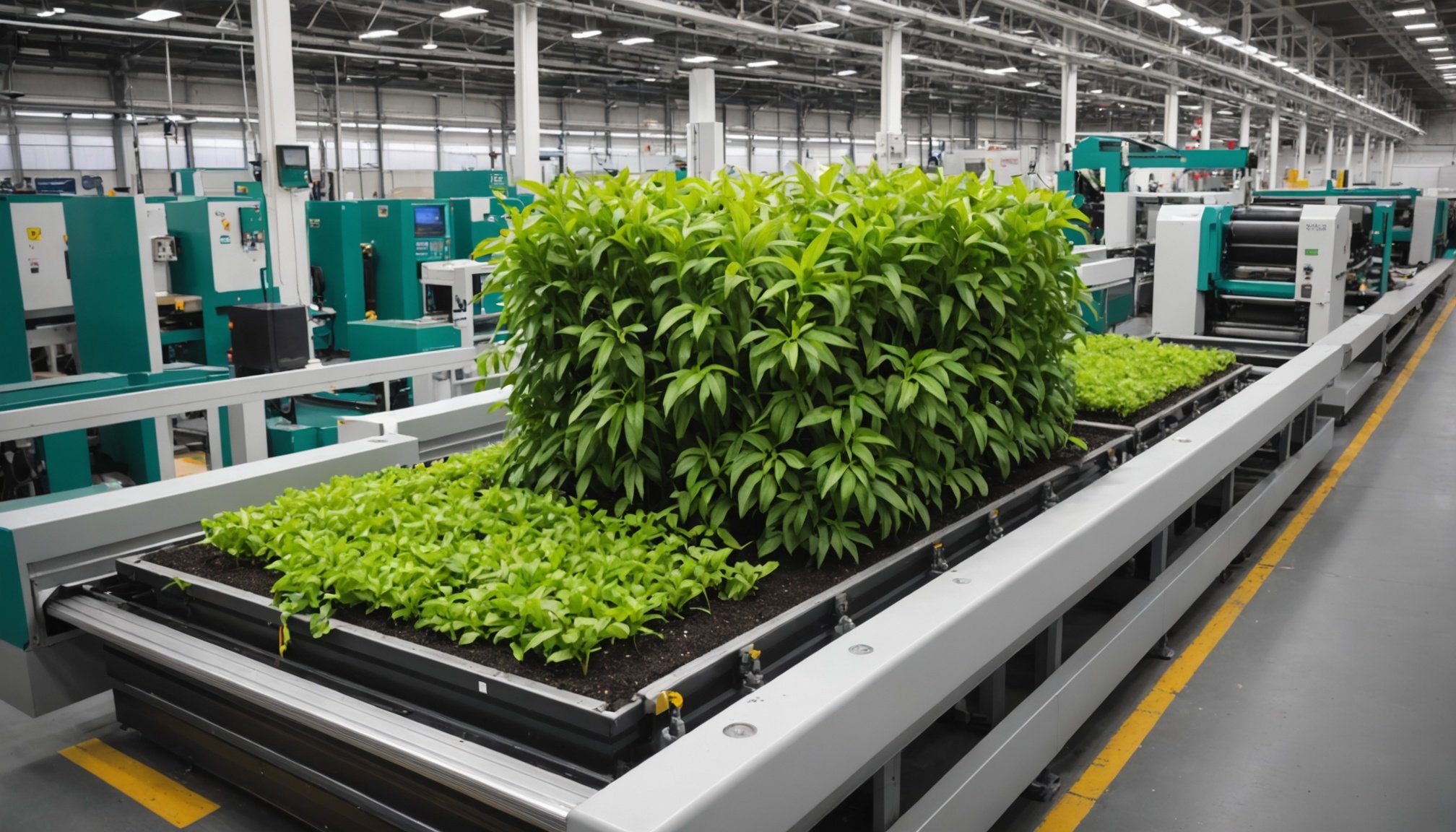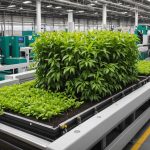Overview of Eco-Friendly Innovations in Manufacturing
Eco-friendly innovations in manufacturing are crucial in promoting a cleaner, more sustainable world. As industries evolve, adopting sustainable manufacturing practices becomes imperative to reduce environmental impact. Current trends highlight a shift towards green practices, such as minimising waste, enhancing energy efficiency, and using renewable resources.
Consumers and businesses both play a vital role in driving these innovations. Businesses can implement technologies that reduce carbon footprints and adopt processes that conserve natural resources. Meanwhile, consumers drive demand for sustainably produced products. Understanding and prioritizing these green practices not only cater to consumer needs but also ensure long-term viability for businesses.
Also to see : Maximizing Efficiency: IoT Innovations for UK Construction Firms in Managing Multi-Site Projects
Sustainable manufacturing technologies include advancements like energy recovery systems and biodegradable materials that transform production efficiency and sustainability. Moreover, integrating digitalisation and smart technologies help streamline processes, thus enhancing sustainable manufacturing.
In a world increasingly aware of environmental concerns, embracing these eco-friendly innovations is essential. By aligning the interests of consumers and manufacturers, a significant step can be taken towards a more sustainable future for both industry stakeholders and the planet.
This might interest you : Effective Ways for British Fashion Companies to Reduce Their Supply Chain Carbon Emissions
Recent Eco-Friendly Innovations in the UK
In the UK, several companies are paving the way in sustainable technologies. These UK innovations are transforming the manufacturing landscape and setting a benchmark for manufacturing advances. For instance, IKEA has introduced innovative use of biodegradable materials in its products, reducing environmental impact significantly. Meanwhile, Unilever is integrating sustainable technologies to minimise water usage across its production lines.
Case Studies of Sustainable Manufacturers
Sustainable technologies have also been embraced by smaller firms like Toast Ale, which repurposes surplus bread to brew beer, exemplifying resource efficiency. These businesses illustrate how UK innovations can lead to significant manufacturing advances while prioritising sustainability.
Innovative Materials and Processes
Incorporating innovative materials like recycled plastics and bamboo composites is central to many companies’ strategies. These materials not only enhance sustainability but also inspire manufacturing advances by offering alternative solutions to traditional resources.
Energy Efficiency Improvements
Companies are also implementing energy-saving technologies such as solar panels and LED lighting. These UK innovations contribute to significant reductions in energy consumption, reinforcing the importance of embracing sustainable technologies. Through such efforts, the UK continues to lead in eco-friendly manufacturing practices.
Actionable Strategies for Implementing Eco-Friendly Practices
Incorporating eco-friendly practices in manufacturing requires well-structured implementation strategies. A critical first step is conducting a comprehensive assessment of current practices to identify areas for improvement. This assessment must evaluate resource usage, waste management, and energy efficiency to align existing operations with sustainable practices.
Staff Training and Awareness
Training employees is vital to embedding sustainable practices within an organisation. Staff should be educated about the benefits and methods of maintaining environmentally-friendly operations, fostering a culture of sustainability. Implementing workshops and continuous learning opportunities can significantly enhance awareness and engagement.
Collaboration with Suppliers
Building a supply chain that prioritises sustainability is essential. Collaborating with suppliers committed to sustainable practices can ensure that raw materials and components align with eco-friendly standards. Open communication and setting clear sustainability criteria can foster stronger partnerships and encourage manufacturing solutions that benefit the environment.
By focusing on these implementation strategies, manufacturers can effectively transition towards more sustainable operations. Engaging both employees and suppliers in this journey ensures that the shift to sustainability is comprehensive and impactful. As a result, businesses can reap the benefits of eco-friendly innovations while contributing positively to the environment.
Statistical Benefits of Eco-Friendly Innovations
Investing in eco-friendly innovations showcases substantial benefits both environmentally and economically. Key statistics reveal significant reductions in carbon emissions and waste through sustainable manufacturing. A recent study highlights that adopting green practices can decrease waste by up to 30%, showcasing the importance of efficient resource use and energy recovery. This efficiency not only benefits the environment but also bolsters the bottom line for businesses.
From an economic perspective, there are notable economic benefits to be gained. Implementing sustainable practices often leads to long-term cost savings. For instance, manufacturers leveraging renewable energy sources can see reductions in electricity costs, while the integration of energy-efficient systems can lower operational expenses.
Furthermore, increasing demand for eco-friendly innovations creates new market opportunities. Consumers are increasingly selecting sustainable products, thus generating increased revenue streams for compliant businesses. As environmental impact becomes a central focus, the adoption of these practices is no longer a choice but a strategic advantage. The tangible benefits of sustainability are clear, encompassing not just planetary welfare but also providing robust economic returns for the manufacturing sector.
Challenges in the UK Manufacturing Landscape
Challenges in the UK manufacturing sector are manifold, particularly manufacturing challenges associated with sustainability. UK regulations present specific hurdles, as manufacturers must comply with stringent environmental standards. These regulatory hurdles, although well-intentioned, can sometimes hinder quick adoption of innovative sustainable practices due to the complex compliance processes involved.
Financial constraints also pose significant barriers to sustainability. Many manufacturers face high upfront costs when transitioning to sustainable production methods. While the long-term benefits and possible cost savings are clear, initial investments in eco-friendly technologies and production practices require substantial capital. This financial strain can deter small and medium-sized enterprises from pursuing eco-friendly innovations.
Moreover, internal resistance to change remains an underappreciated challenge in adopting green practices. Adjusting existing operations can meet with reluctance from stakeholders accustomed to traditional manufacturing methods. Strategically fostering a culture of sustainability within organisations can address this resistance. Promoting the benefits and necessity of sustainability can pave the way for successful implementation of sustainable manufacturing solutions. Education and continuous dialogue with workforce and stakeholders are key strategies to overcome this internal barrier.
Future Trends in Sustainable Manufacturing
In the coming decade, sustainable manufacturing is poised to evolve significantly. Driven by emerging next-gen manufacturing technologies, the sector is expected to adopt future innovations that enhance both efficiency and eco-friendliness. Cutting-edge advancements, such as artificial intelligence and the Internet of Things (IoT), will likely revolutionise production processes, fostering sustainable trends that offer environmentally friendly solutions while optimising resource use.
Government and industry collaboration is crucial for nurturing these sustainable innovations. By implementing policy frameworks and providing incentives, governments can encourage industries to transition towards next-gen manufacturing technologies. Such collaboration can ensure that regulatory environments are supportive rather than restrictive, facilitating smoother adoption of eco-friendly practices.
Furthermore, future innovations will focus on reducing emissions and waste. Companies may integrate renewable energy systems and develop materials with a lower environmental impact. The role of sustainable trends will be key in meeting consumer demand for greener products, thus driving market transformation.
Investing in research and development is vital. The synergy between technology and sustainability will define the manufacturing landscape, positioning businesses at the forefront of the next-gen manufacturing revolution. With sustained efforts, the future of manufacturing can be both innovative and sustainable.











